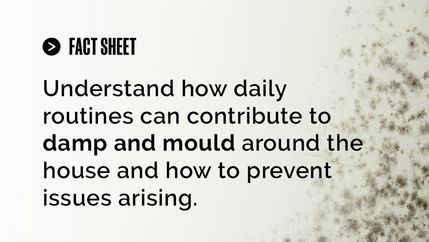
The inquiry will assess whether UK Government policies, mainly outlined in the Renters’ Rights Bill, are effectively raising standards and whether further reforms are necessary to safeguard tenants and assist landlords. Their findings will be published along with recommendations for Ministers.
Propertymark conducted a survey and roundtable sessions with members to inform our response to the Committee. We will continue to represent their views by making the case for reforms that raise professional standards for property agents, give tenants confidence that poor conditions will be addressed, and support landlords to invest in improvements without leaving the market.
Tackling poor conditions in the PRS
While the overall condition of homes has improved in recent years, hazards such as damp and mould remain widespread, especially in older properties. Piecemeal changes will not be enough, and reforms need to address the root causes of poor conditions, including.
Mandatory qualifications for letting agents. At present, anyone can set up as a letting agent in England without training or professional oversight. The UK Government must require all agents to hold minimum qualifications and complete continuing professional development. This would help raise standards and give tenants greater protection.
Compulsory property inventories. Inventories at the start and end of a tenancy should be a legal requirement. They provide essential evidence in disputes and help protect both tenants and landlords.
A statutory Code of Practice for the PRS. A clear, enforceable Code to underpin how homes are let and managed would provide consistency across the sector and strengthen the hand of redress schemes.
Resourcing enforcement. Local authorities often lack the staff and resources to inspect homes and follow up on complaints. Better funding should be provided for councils to uphold existing rules effectively, rather than relying solely on new legislation.
Decent Homes Standard
We support the plan to extend the Decent Homes Standard to the PRS as part of the Renters’ Rights Bill, but we caution against a one-size-fits-all approach. Our evidence clearly demonstrates that the Standard must be flexible enough to reflect different property types and ages. Requirements such as compulsory carpets in every room or mandatory window restrictors may not be needed, wanted, or even suitable in all properties. Instead, the rules should focus on functionality, ensuring homes are safe and fit for purpose without reducing choice or supply
Our members raised concerns about grey areas, such as how to judge appropriate action in cases of minor damp and mould, or whether excessive heat might trigger requirements like air conditioning. To address this, the UK Government must provide clear guidance on acceptable levels of disrepair, best practice examples, and explain how enforcement will work.
Furthermore, a standardised national enforcement framework is needed, and the Housing Health and Safety Rating System (HHSRS) must be aligned with the Decent Homes Standard to ensure enforcement is applied fairly and evenly across the country.
Awaab’s Law
Extending Awaab’s Law to the PRS will place legal time limits on agents and landlords to fix dangerous hazards such as damp and mould, a move which Propertymark supports.
However, policymakers must understand that the sector will need to invest in training, improved property management systems, tenant communication, and rapid response processes. Without UK Government support, some agents and landlords may struggle with the extra costs, potentially reducing supply.
Dispute resolution must be reformed
A streamlined housing tribunal would provide a quicker, more reliable way to resolve cases, reducing dependence on an overstretched court system. A fair and effective dispute resolution system is the only way to see better housing standards.
Court delays mean that possession and housing condition cases can take many months to resolve. This leaves tenants stuck in poor conditions and landlords unable to act when there are serious arrears or anti-social behaviour. Slow justice risks deterring landlords from staying in the sector, reducing supply even further.
Wider considerations
Energy efficiency reforms must be realistic and achievable. Targets must reflect the age and condition of properties, and funding support is vital to prevent landlords from leaving the sector. In May 2025, one of our members, a large independent property agency based in Yorkshire and Humberside representing around 950 properties, where roughly 42% of their stock is an EPC D, said, “most of our housing stock is terraced houses. To try and successfully make these all a C rating or above, without huge disruption to tenants and significant cost to the client, is almost impossible.”
Additionally, new build quality must not be overlooked. Stronger building regulations, mandatory accessibility standards, and investment in construction skills are all vital to ensure homes built today are fit for the future.







